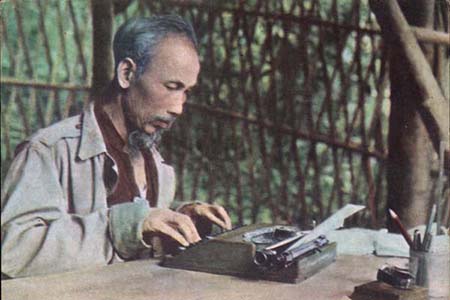Hoang Huu Khang, one of President Ho Chi Minh's bodyguards, relates his experience with the president: Around the end of August 1945, I was asked to move from the resistance base in Viet Bac to Hanoi for a new assignment. I was overjoyed to find out that I was to become a personal bodyguard for Uncle Ho (the name Vietnamese people use when referring to President Ho Chi Minh).
.jpg)
Before I left, Mr. Nguyen Luong Bang, who was later to become vice- president of Vietnam, met me. "You're so good at martial arts," he said. "I know that, without any weapons, you rescued the Party Secretary of Tien Hai District from French secret agents in Thai Binh Province. The guards in Son La Prison all know that you alone downed five armed guards and freed six imprisoned comrades. Now, Uncle Ho has moved to Hanoi. The situation there seems quiet, but lots of anti-government activities continue underground. The French colonialists are trying to provoke us into military action. Uncle Ho has ordered our armed forces to restrain themselves. If just one shot is fired by our side, it may cause the French colonialists to attack. Uncle Ho must travel a lot within the city. We must insure his safety. That's the reason the Party's Central Committee has assigned you as one of his personal bodyguards."
Then Mr. Nguyen Luong Bang gave me a brand new pistol and dozens of bullets. I was delighted with this new gun and the shiny copper bullets. However, Nguyen Luong Bang added, "I hope that you will fulfill your task successfully without having to use this gun." I had met Uncle Ho when I was in Viet Bac. He led a very simple life then. In Hanoi, he still kept this same simple lifestyle. He worked hard day and night. I was in charge of a: group of six guards, including Mr. Vu Ky, Uncle Ho's secretary.
It was clear to us that fighting would be part of our job. Each bodyguard had a pistol, but since we were already good at marksmanship, we concentrated on practicing martial arts and learning how to detect suspicious movements around Uncle Ho whenever he traveled. Every day (sometimes at night), after we had assigned a member of the group to protect Uncle Ho, the rest of us would find an unoccupied room in the Tonkin Governor's Palace, close the door, and practice martial arts. We always began with a defined set of martial arts movements. Then we moved on to standing, defending, and attacking positions, and basic movements such as blow striking, parrying, and kicking.
One day, Uncle Ho came in while I was teaching a set of martial art movements called bat bo. I told him that the set contained all the basic movements and stances in martial arts. It was nearly time for dinner so I thought Uncle Ho would only watch, but he took off his coat and sandals, stood in the line and practiced with the group. I was too surprised to say anything when he said: "Khang please let me practice with you, but I can only do this when I'm not working." We practiced more sets of movements along with Uncle Ho and then stopped for dinner.

About three or four days later, when I was guarding Uncle Ho's home, he came to me and said, "So you're on duty tonight, aren't you?" “Yes, I am.” I replied.
He folded the newspaper he was reading and said: "Let's practice martial arts! Lock up my room." We found a room, opened the windows, turned on the light, and started practicing. He learned the movements very quickly and performed them flawlessly. I taught him a set of fifty-two movements at a stretch. I then suggested he go to bed, fearing he might become exhausted.
The next morning, I got up early to practice hitting the trunk of an old tree with my fists. On my way to the yard, I saw Uncle He smoothly performing the set of movements I had taught him the night before. He was dripping with sweat. Seeing me, he joked: "I enjoyed a sound sleep last night thanks to the set of movements you taught me. My muscles all hurt, but the usual pain in my knees is less. From now on, please teach me martial art sets twice a day, in the morning and in the evening! I will try to do these sets well so that soon you can start teaching me martial art techniques."
After that, we always practiced twice a day whether he worked in the Tonkin Governor's Palace or at other secret places in Hanoi. One day, as I was crouched, practicing "striking straight ahead with both fists," Uncle He saw me sweating. My thigh muscles were tense. "How long can you strike like that?" he asked.
I told him that since I was accustomed to this exercise, I could do it for hours. "I wish I were as strong as you," he said smiling. "I think that if I did this exercise, I could get rid of the pain in my knees." On Lunar New Year's Eve in 1946, the first year of national independence, we escorted Uncle Ho to visit the families of some poor workers and intellectuals who had contributed to the revolution. We then went to Ngoc Son Temple to join in the ritual of picking tree branches for good luck. That night, Uncle Ho stayed at No 8 Thuy Ta Street (now Le Thai To Street) instead of at the Tonkin Governor's Palace. Although he went to bed very late, the next morning, he got up at exactly 5 A.M. "Mr. Khang!" he called. "Wake up! To begin the New Year, let's do some martial arts movements!"

We did one set of movements twice. Then Uncle Ho practiced regulating his breath while I stood in a low-hip stance to practice blow-striking. "When you're in that stance," Uncle Ho asked, "if I push at you with great force, will you fall?" I said it would be difficult to move me. He pushed me hard three times at the back and at both sides, but I did not fall. "Train everybody in your group to do that," he said. "You should all practice it regularly. I hope your group will continue to be good at martial arts and remain very strong."



